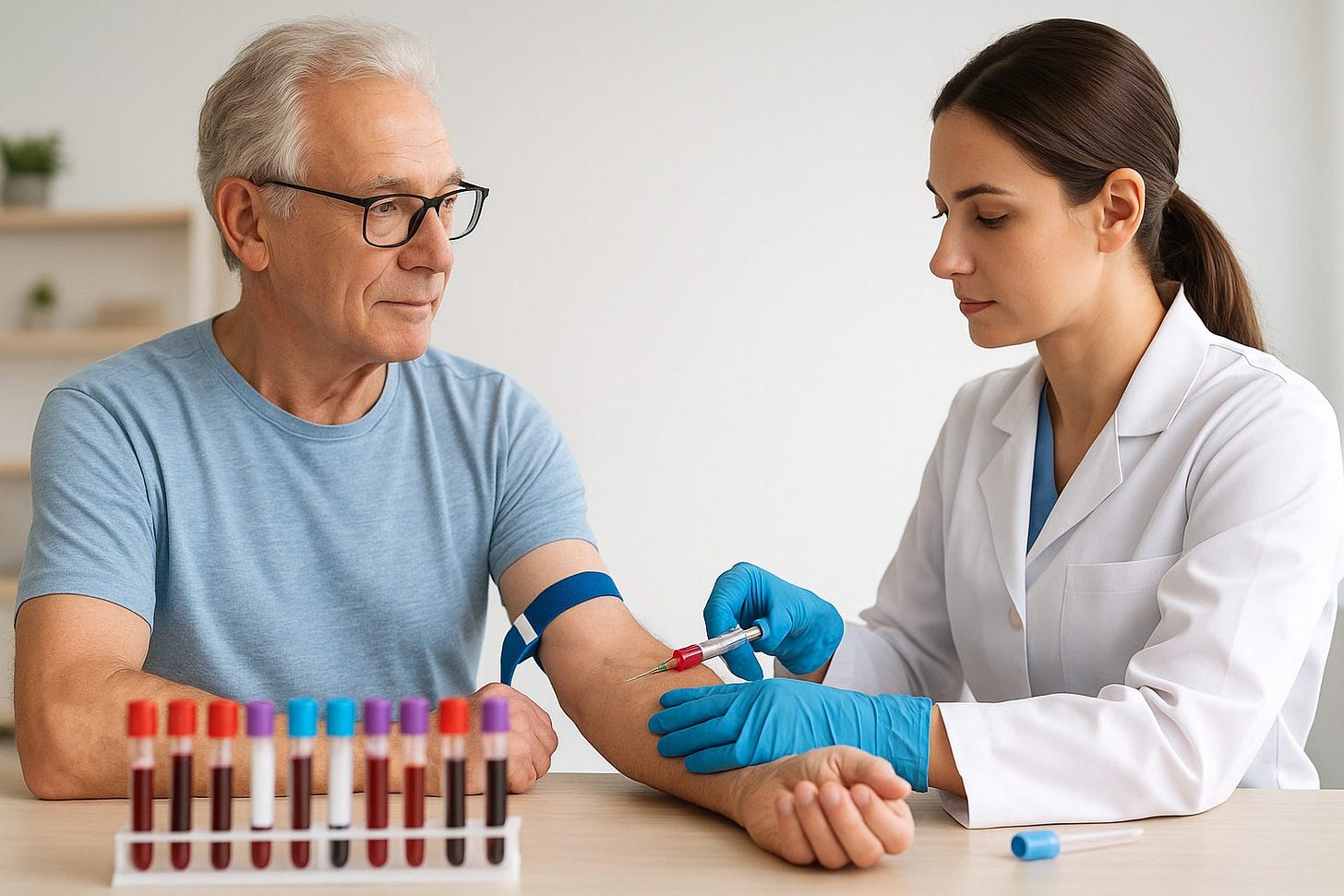7 Blood Tests Everyone Interested in Longevity Should Get
Unlocking the blood-science behind a longer, healthier life 🧬
If you’re serious about living not just long—but well—then the phrase “one health-panel to rule them all” gets less amusing and more actionable. Imagine your bloodstream as a highway carrying signals about your body’s future—your risk of disease, your aging speed, your bounce-back capacity. The smart move: get ahead of trouble by measuring the right things now. I think most of us assume “we’ll see what happens,” but real longevity believers don’t wait. They test. They adjust. They optimize.
In this article I walk you through seven key blood tests that everyone who cares about longevity should seriously consider. These aren’t just “good to have”—they’re high-yield windows into your biology. (Yes, I hear the tiny groan at the idea of another lab order—but trust me: it’s worth it.) Let’s dive.
1. Complete Blood Count (CBC) & Differential
A solid starting point.
The CBC tells you about your red blood cells, white cells, platelets—basic stuff, yes, but foundational.
Why it matters for longevity: it flags early signs of anemia, infection, immune dysregulation or bone-marrow stress. When these early flags pop up, you’re more vulnerable to downstream issues.
If you haven’t had a CBC in a while (or ever), this is a good first pick. Ask your doctor for “CBC with differential” so you capture more nuance.
2. Lipid Panel + Apolipoproteins (ApoB/ApoA1)
Cholesterol is passé as an only-marker; it’s time for nuance.
Standard lipid panels (LDL, HDL, triglycerides) matter. But for next-level longevity tracking you add apolipoproteins—especially ApoB (the “bad guy” transport) and ApoA1 (the “good guy”).
Why: a study of long-lived individuals found that favourable lipid/apolipoprotein profiles aligned with higher odds of reaching 100.
Tip: ask your provider for “Lipid panel including ApoB/ApoA1.” Knowing your particle count is better than just knowing “LDL 130.”
3. Fasting Glucose / HbA1c / Insulin
Metabolic health is the core of longevity.
Monitoring your blood sugar over time (HbA1c) and fasting glucose is critical. According to the MitoHealth blog: • HbA1c ideal < 5.2% • Insulin levels also matter (often ignored).
Why it’s crucial: Elevated glucose and insulin resistance are key drivers of age-related diseases (cardio, dementia, cancer). Research on centenarians found lower glucose was a strong signal for “making it long.”
Action: Ask for “fasting glucose,” “HbA1c” and if possible “fasting insulin.” If insulin’s high, consider lifestyle interventions early.
4. Inflammatory Markers (hs-CRP, IL-6, etc.)
Inflammation quietly wrecks longevity.
Tests like high-sensitivity C-reactive protein (hs-CRP) and interleukin-6 (IL-6) tell you the degree of low-level chronic inflammation you’re living with.
Why it matters: Aging faster? Chances are inflammation is a driver. One longevity-study found centenarians had lower CRP and other inflammatory markers.
Tip: Ask your doctor for “hs-CRP” (not just standard CRP) and if possible “IL-6” or similar. If elevated, lifestyle changes (sleep, diet, stress) become high-priority.
5. Kidney & Liver Function + Creatinine/Albumin
Your filtration and detox teams matter.
Simple tests like creatinine (kidney), albumin (nutrition + liver), AST/ALT/ALP/GGT (liver) show early signs of organ stress.
Why: A Swedish cohort found lower creatinine and favorable albumin associated with longer lifespan.
Action: Ensure your “comprehensive metabolic panel” or “CMP” includes these. If values drift, give your liver/kidney a break (e.g., reduce alcohol, optimise medications, improve diet).
6. Thyroid Function + Hormones
Internal thermostat and hormones = big deal.
While often skipped, thyroid (TSH, free T3, free T4) tells you about metabolic rate and aging. And broader hormones (testosterone, estradiol, DHEA-S) matter too.
Why: Hormonal health influences muscle mass, bone density, metabolic health—key for aging well.
Tip: Ask for “full thyroid panel” (TSH + freeT3/freeT4) and check hormones especially if you’re over 40 or noticing symptoms (fatigue, low libido, muscle loss).
7. Vitamin D / B12 / Nutrient Markers
You can’t ignore the building blocks.
Tests for vitamin D, B12, iron/ferritin, maybe even magnesium and omega-3 index: these matter.
Why: Nutrient deficiency may silently undermine longevity—even if other tests look fine. A study found that centenarians tended to have optimal nutrient-profiles decades before 100.
Action: Ask for “25-hydroxy vitamin D,” “B12,” “ferritin/iron,” maybe “magnesium” if available. Aim for optimal, not just “within range.”
Also read: 3 Longevity Blood Tests You’re Not Getting—But Should Be
Final Thoughts & Next Steps
Let’s be clear: getting these tests doesn’t guarantee immortality. But it does shift the odds. These tests give you actionable data. And in the longevity game, data = power.
Here’s what you should do now:
✅ Schedule a full blood panel including the seven categories above.
✅ Share the results with your doctor—discuss what’s optimal vs. “just okay.”
✅ Make a plan: If a test is off, identify interventions (diet, sleep, exercise, medications).
✅ Track over time. Retest annually (or more often) and watch your trend lines.
✅ Ask: “How will this help me live better, not just longer?”
And take it from there. Good luck!


